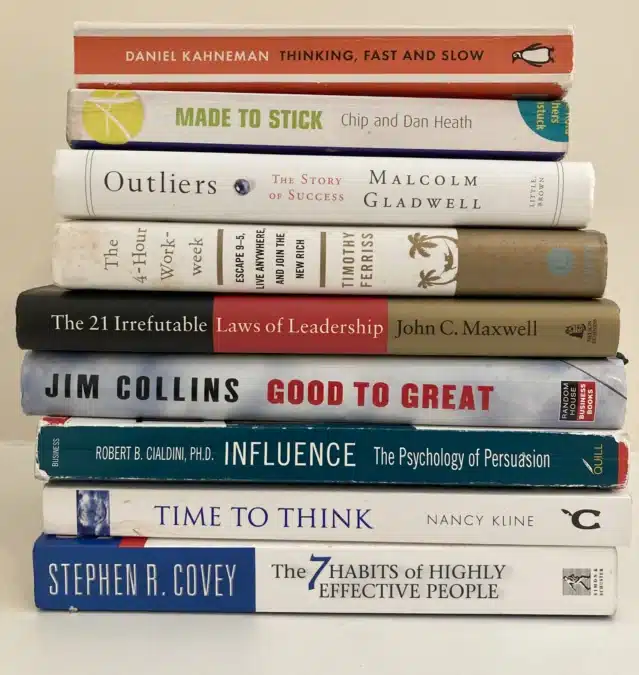Here are the books that I recommend the most to other people. The list reflects my favourite writings on leadership, management, work, strategy, decision-making and success in life.
I read (and listen to audible books) vociferously but these books have impacted me most and are ones that I keep re-reading, referring to and recommending to others.
You may well recognise a few but hopefully, you will find some to add to your reading list. I hope they help you as much as they have helped me!
For understanding how to be a leader and manager
The 21 Irrefutable Laws of Leadership by John C. Maxwell is one of the best-selling leadership books of all time. One of the reasons is that it is easy to read and apply. If you are wanting to examine your strengths and weaknesses as a leader then this book is a great aid. I find that Maxwell’s definition of leadership as ‘influence’ as being one of the most useful paradigms for thinking about leadership, in all its forms.
For people who want to lead but don’t feel confident
There is little evidence to support the idea of people born to lead, but when you step into leadership (or it is thrust upon you) it can be daunting looking at all the confident looking executives that seem to be everywhere you look. The truth is, even experienced leaders can feel a lack of courage when faced with the challenges of leading authentically in an ever more challenging environment. That is why I recommend reading Dare to Lead by Brene Brown no matter where you are on your leadership journey.
For people exploring their own or their company’s purpose
The obvious choice here is Start with Why by Simon Sinek. It is an easy and pleasurable book with a simple premise: why people do things is more important to understand than just what they do.
The other book I recommend is Good to Great by Jim Collins. It is a bit dated now, especially as some of the example companies have failed to remain great since publication, but there are still some great insights in this book such as the ‘hedgehog principle’ that helps to work out an organisation’s sweet-spot for success.
For understanding business strategy
Strategy is a common word in the business (as well as military and political) lexicon, but it is very hard to get any two people to agree on a definition of strategy, let alone how to make one. Good Strategy Bad Strategy by Richard Rumelt does a great job in sifting through what is and isn’t a strategy and then outlines the building blocks of developing a good one.
For leading people through change
Leadership is all about steering people through change. Change is a constant (and therefore so is the need for leadership) but this is often forgotten, particularly in large institutions. Another common mistake is trying to implement change management without the right leadership direction. Leading Change by John P. Kotter outlines the steps of successful change leadership, based on over 25 years of experience in the field.
For those starting a new business
The Lean Startup by Eric Ries is required reading for any entrepreneur and start-up, but should also be read for those working in larger corporations. Every size of business have to deal with complexity and fast-moving change, the principles of ‘lean’ organisations and agile management are relevant to all.
For people who want to understand and build teams
In terms of identifying team roles and helping team members understand each other, I still refer to R. Meredith Belbin’s work, captured in his book Team Roles at Work. The 9 roles, identified by Belbin in his research, are a useful framework for analysing or building any team.
For people who want to develop their communication, listening and soft skills
Good communication is dependent upon people’s ability to listen effectively. It turns out that is also the case for quality thinking as well. If you want to improve your active listening skills (and other so-called soft skills such as question technique and rapport building) then I cannot recommend the works of Nancy Kline highly enough. Her insights have transformed how I coach, facilitate meetings, even the way I talk to my family. Her first book, Time To Think is a great place to start.
For people who want to understand and influence groups
Influence: The Psychology of Persuasion by Robert B. Cialdini is the go-to book on this subject. The seven principles outlined in the book provide a real insight into influence at scale. But if you are wanting to influence lots of people and their decision-making then Nudge by Richard H. Thaler and Cass R. Sunstein should be on your bookshelf too.
For people who want to understand and influence individuals
If you want to understand and influence people at a one-to-one level, then I recommend the book Rapport by Emily and Laurence Alison. The Alisons are world leaders in forensic psychology and have honed a framework for building rapport through 30 years of experience in trying to effectively communicate with the most challenging of people. It has been proven with terrorists, hardened criminals…even teenagers!
For people who want to improve their presentations and public speaking
Who doesn’t enjoy and admire a good TED talk? Well, the same principles that make a viral TED talk can be used in other presentations and public speaking engagements. The TED Talks official guide to public speaking by Chris Anderson is one of the most practical books on presentation skills you will find, and the evidence for it…well just go and see another TED talk!
For people who want to communicate an idea effectively
TED talks are all about communicating one big transformative idea. If you want to know how to make that idea go viral then read Made to Stick by Chip and Dan Heath. The Heath’s give you all the ingredients for turning an idea into a great story that people will remember and want to share.
For people who want to market and sell their idea
Once you have your idea, you have crafted it, packaged it and know how to communicate it, then you are ready to sell it. Daniel H. Pink’s book, To Sell is Human, is a great compliment to the other books listed above. It is particularly helpful if (like me) you are not a natural salesperson or can’t shake the negative connotations of marketing.
For people who only want to ever read one self-help book
The Seven Habits of Highly Effective People by Stephen R. Covey was the first self-help book I ever read, and I still refer back to it. There is a good reason why it is still a best-seller today, there is a lot of wisdom to be found in the book, particularly around being ‘principled centred’, a theme which echoes in Simon Sinek’s book Start with Why.
For challenging the 9-5 culture and getting work-life balance
The 4-Hour Workweek by Tim Ferriss is a provocative read. Tim Ferris uses hyperbole, over-simplification and clever marketing to get his point across, but his book is still a useful challenge to the ways we choose to work. It is always good to examine why we work the hours we do and how we can be more effective, even if we don’t want to fully buy into Ferris’ idea of the ‘new rich.’
If you are thinking of creating new ways of working within your organisation then I would also recommend Brave New Work by Aaron Dignan. Dignan gives practical advice that can help businesses function more effectively and is particularly poignant as teams seek new ways of operating in the post-pandemic world.
For understanding how decisions work
Simply put, Thinking Fast and Slow by Daniel Kahneman is the most influential book on decision-making in at least the last 20 years. Kahneman’s research has transformed the way we understand psychology, demonstrating the limits of human rationality, and thereby challenged a lot of traditional economics. A must-read.
For integrating values into decision-making
If, after reading Kahneman, you want to think about how you make choices in line with your values or want to incorporate new decision-making processes into your organisation, then I recommend reading Principles by Ray Dalio. Dalio became a successful individual and built a highly successful company, by embedding his values into his decisions in life and work. He shares the principles and the approach in his book.
For people who want to be world-class in what they do
If you want to be excellent at what you do, in whatever field and with whatever skill, then it takes hard work and time. Most people are aware of the science of expertise due to Malcolm Gladwell’s bestselling book Outliers, but it is Peak by Robert Pool and Anders Ericsson that best explains the secret to success and how deliberate practise makes the difference between good and exceptional people. Both are great books but if you read one, read Peak.
For people who want to develop better habits
Achieving our goals is generally down to our behaviours. Our success in being productive, in keeping fit and healthy, in learning new skills, is all dependent upon the habits we have, be they good or bad. If you want to properly analyse the habits you have and build new (and better) ones then read The Power of Habit by Charles Duhigg.
For people who want a healthier and more balanced life
There is a ton of advice out there about daily routines and examples of people who seem to get by with little sleep. But before you try to emulate any of them read Why We Sleep by Matthew Walker. The clinical research on sleep is eye-opening (excuse the pun) and the science will inform how you construct your days and nights. I radically changed my routines as a result of this book and feel healthier and more energetic as a result.
I am always reading and updating my book lists so do let me know your favourites or what you think of my recommendations above. Happy reading!



